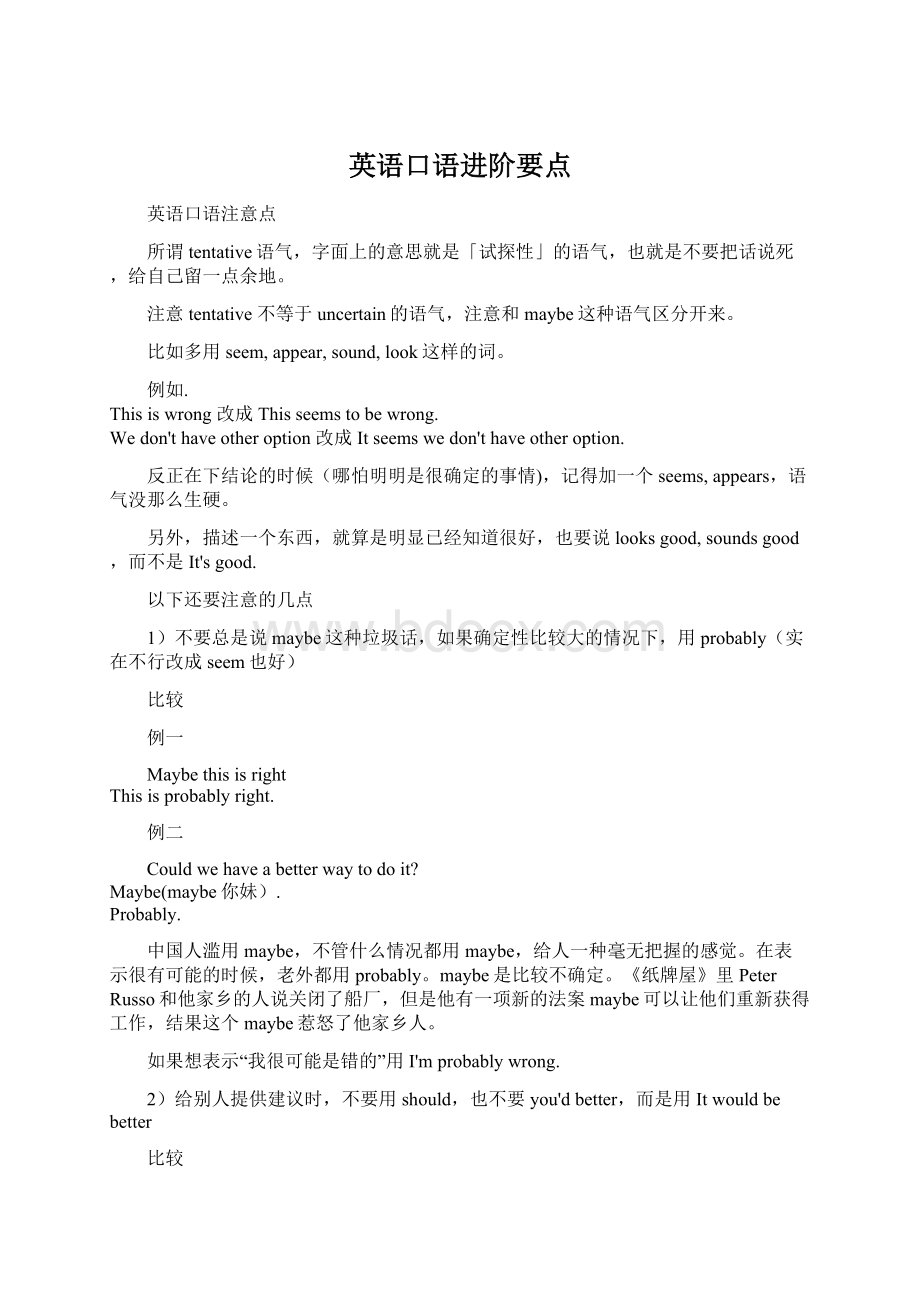英语口语进阶要点.docx
《英语口语进阶要点.docx》由会员分享,可在线阅读,更多相关《英语口语进阶要点.docx(19页珍藏版)》请在冰豆网上搜索。

英语口语进阶要点
英语口语注意点
所谓tentative语气,字面上的意思就是「试探性」的语气,也就是不要把话说死,给自己留一点余地。
注意tentative不等于uncertain的语气,注意和maybe这种语气区分开来。
比如多用seem,appear,sound,look这样的词。
例如.
Thisiswrong改成Thisseemstobewrong.
Wedon'thaveotheroption改成Itseemswedon'thaveotheroption.
反正在下结论的时候(哪怕明明是很确定的事情),记得加一个seems,appears,语气没那么生硬。
另外,描述一个东西,就算是明显已经知道很好,也要说looksgood,soundsgood,而不是It'sgood.
以下还要注意的几点
1)不要总是说maybe这种垃圾话,如果确定性比较大的情况下,用probably(实在不行改成seem也好)
比较
例一
Maybethisisright
Thisisprobablyright.
例二
Couldwehaveabetterwaytodoit?
Maybe(maybe你妹).
Probably.
中国人滥用maybe,不管什么情况都用maybe,给人一种毫无把握的感觉。
在表示很有可能的时候,老外都用probably。
maybe是比较不确定。
《纸牌屋》里PeterRusso和他家乡的人说关闭了船厂,但是他有一项新的法案maybe可以让他们重新获得工作,结果这个maybe惹怒了他家乡人。
如果想表示“我很可能是错的”用I'mprobablywrong.
2)给别人提供建议时,不要用should,也不要you'dbetter,而是用Itwouldbebetter
比较
Thisdesignshouldbechanged.
Itwouldbebetterifwecanchangethedesign.
3)表示一件事希望你做,但是不强求时,用Itwouldbenice/great而不是Ineedyoutoxxx,Ihopeyouxxxx,couldyou?
Ihopeyoucancometoday.
Youneedtocometoday.
Couldyoucometoday?
Itwouldbenice/greatifyoucancometoday.(隐含的意思是stillOKifyoucan'tmakeit.)
再举个例子
比较
Canyoubringsomewinetotheparty?
Itwouldbenice/greatifyoucanbringsomewinetotheparty.
4)问别人你要东西/信息时,用MayIhave...?
而不要Couldyougiveme?
比较
例一
What'syourname?
MayIhaveyourname?
例二
Couldyousendmethedrawingtoday?
MayIhavethedrawingtoday?
例三《血战钢锯岭》里,法官要老Doss把那封信给他,他是说MayIhavetheletter?
而不是Couldyougivemetheletter?
例四问别人有没有时间
CouldIhaveaminute/momentofyourtime?
(非常非常礼貌,销售员问法)
Doyouhaveaminute/moment?
?
(一般礼貌,同事朋友之间问法)
例五你比如你想独处一下,比如想打个私人电话,要别人回避一下。
Couldyoucomeout?
CouldIhaveamoment(formyself)?
5)问别人是否可以做一件事时,用Isitpossiblethat...比Couldyou..更礼貌
比较
例一
Couldyouchangethedesign?
Isitpossibleforyoutochangethedesign?
例二
Couldyoucallmetomorrow?
Isitpossibleforyoutocalltomorrow?
6)请别人帮忙做一件事时,在前面加(by)anychance,意思是如果有时间/有机会,很委婉。
Byanychance,couldyouhelpcheckthedata?
有时间可不可以帮忙看看数据?
7)指责别人时候,用现在进行时比一般现在时要更委婉。
比较
你很没耐心/强词夺理/无理取闹
Youareimpatient/argumentative/unreasonable
Youarebeingimpatient//argumentative/unreasonable
说前者会得罪很多人,因为你用一个are就把别人完全说死了,正常的说法是用being,这样表示某时某刻这个人处于的状态,不表示你把他彻底说死。
8)表达要求时多用进行时。
比较
Weneedtodothisassoonaspossible
Weneedtobedoingthisassoonaspossible.
老外普遍用后者用的多。
《纸牌屋》里,Clair的母亲对她的一帮朋友说我们要支持Clair,说的就是Weshouldbesupportingher,而不是Weshouldsupporther.
以上两种情况中,如果不用进行时,就有表示永久去做这件事的意思,用进行时就可以委婉表示我们会进入这种状况,不是永久的。
9)用wouldlike代替want吧
中国人用want比较多,但是want稍微带要求的意思,用wouldlike就委婉一点。
我想要和你开个会。
Iwanttohaveameetingwithyou.
I'dliketohaveameetingwithyou.
10)用过去式表示一种委婉语气
口语中经常用过去式表示一种委婉语气,比如Iwanted,I
thought,Iwasthinking,Iwaswondering,Iwashoping其实说话留下余地,因为这是表示过去的状态,没有说明现在的状况,从而形成一种委婉。
很多人误以为thought就是"以为”用来表示过去的错误想法,其实不是,只是表示过去的状况,不一定是和现在相反。
thought一样可以理解成“认为”.
11)慎用please
please有时候稍微带一点要求命令的语气,特别是在给客户或者老板写邮件请求某件事,把please替换成疑问句。
比较
例一
Pleasereplytomebytoday.
Couldyoureplytomebytoday?
而以下情况下用please就没问题,因为有letme
Pleaseletmeknowyourfeedback.
12)用let,allow更礼貌
比较
例一
Pleasetellmeyourfeedback.
Pleaseletmeknowyourfeedback.
例二
Iwanttomakeaproposal
Pleaseallowmetomakeaproposal.
13)不要不分场合乱用screw,suck这些非正式用语。
我专门写过一篇文章讨论,吐槽鲁豫在节目中用screwup这个词
Ifyouscrewthisup,youwillnothaveasecondchance.
14)由于客观上导致做不到,notableto代替cannot
SorryIcan'tcometothepartytodaysinceI'llneedtoworkverylate.
SorryI'mnotabletocometothepartytodaysinceI'llneedtoworkverylate.
15)给need加将来时,更加委婉。
比较
Youneedtobuyanewmachineifthisonedoesn'twork
You'llneedtobuyanewmachineifthisonedoesn'twork.
16)美国人特别喜欢用Iguess代替Ithink表达委婉的语气。
比较
例一
Ithinkwe'llleavenow.
Iguesswe'llleavenow.
例二
Ithinkwecandobetter.
Iguesswecandobetter.
17)用I'mgood代替no
中国习惯yesorno式的思维。
但是有些场合回答no未免有点唐突,美国人一般用I'mgood来婉拒(帮助或者好意),等于说I'mfeelinggood/I'msatisfiedanddon'tneedanything.
Wouldyoucareforsomecoffee?
I'mgood.Thankyou.
18)指责别人用Youarebetterthanthat.
指出别人错误的时候,一般不说youarewrong/careless/weak,一般说youarebetterthanthat,这是非常常见而且礼貌的说法。
19)某些负面情况下用havedifficulty代替can't,委婉把责任推向自己这边
Ican'ttrustyou.
Ihavedifficultytrustingyou.
Idon'tunderstandyourquestion.
Ihavedifficultyunderstandingyourquestion.
20)委婉命令别人做某事,用itmightbeagoodidea比please要礼貌《萨利机长》里空姐要求乘客把安全带系上,说的是
Itmightbeagoodideatofastenyourseatbelt.
21)给别人讲题的时候不要说"Doyouunderstand?
",要问"Doesthismakesense?
"。
上课的时候不要说"Whichpartdon'tyouunderstand?
",可以说"WheredidIloseyou?
"。
22)到非英語国家問別人能否說英文
常見錯誤句式CanyouspeakEnglish?
在別人聽起來像是“你就不能說英文嗎?
”而不是“你懂不懂說英文”?
正確的用法是:
DoyouspeakEnglish?
23)对方告诉你一件事情,你想回答“我知道”的时候,不要说Iknow.要说Isee
多使用redress修饰语,通过modification,additions减弱表达的程度。
在现实生活中,有以下几种情况需要baldexpression
1casesofgreaturgencyanddesperations
在异常紧急的情况下
Help!
Justgivemeamoreweek!
Watchout!
2attention-gettersusedinconversations
在演讲过程中,演讲者尝试引起观众的注意
Listen,I'vegotanideathat..
Look,thepointisthis…
3imperatives祈使语气
Givemoney(beggarsinindia)
Excuseme
Acceptmythanks
Forgiveme
又如表达恳求:
Entreaty
don'tforgetus!
Sendmeapostcard!
这里同时需要注意的是:
紧急情景中的表达也需要do,please修饰
sometimesurgencyisexpressedwithpositive/negativepolitenesshedge
Do:
Dogofirst.
Please:
Please,comein.
4task-oriented为完成具体任务合作服务的对话
Givemeanother1000.
Lendmeahandhere.
5teasingandjoking
常见在熟人之间开玩笑,使用不会有冒犯别人的风险
Withouttheriskofoffending
6speakerconveysthathedoescareaboutaddressee,sympatheticadviceorwarnings
说话者关心听者而说的话,同理心驱使下给出的建议与警告
Careful!
Heisadangerousman.
7Welcome,greetandfarewells;
Takecareofyourself./Begood./Havefun.
8主动提供..Offers
Havesomemorecakes.
Don'tbother.I'llcleanitup.
9表达自己不介意,减少对方顾虑
Don’tworryaboutme
(Feelfreetogetonwithyourbusinessanddon'tworryaboutoffendingme)
日常生活大部分时间里,面对工作上的同事,伙伴,有接触不熟悉的人,我们都需要用redress,表示我们在意对方的感受,利益,需求:
1Jokeandtease:
例如面对对方无意的fauxpas失礼
“Weatetoomanybeanstonight,didn'twe?
”
“Godyou'retoofartytonight.”
这时候你可以通过joking玩笑表示你注意到了但不会在意
2借助反意疑问句,把听者带入你说话的情境中,
Usetagquestion,dragaddresseeasaparticipateintotheconversation
"Youknow?
""SeewhatImean"
"Isn'tit?
"
3通过夸张,体现你对你们所谈论事物话题的兴趣,与对方交谈的兴趣
exaggerate(interest,approval,sympathy)
e.g.WhataFantasticgardenyouhave
Howabsolutely(marvelous,extraordinary,incredible,devastating)
4使用群体内部的称呼,表明你和对方立场一致
usein-groupidentitymaker
e.g.Helpmewiththisbaghere,honey/buddy/mate
5通过tokenagreement(虚假同意,出于礼貌意义上),巧妙的纠正对方的话,提出反对
避免与对方观点对立,引起不愉快或争执
“Yes,but…”
-Soisthispermanent?
-Yeah,it'spermanent-permanentuntilIgetmarriedagain.
-That'swhereyoulive,Florida.
-That'swhereIwasborn.
6含糊表达自己的观点,除非你很清楚对方的立场与态度(详见第3点)
Hedgethisextreme,makeopinionsafelyvague,unlessspeakerknowaddressee'soptiononthesubject
“Ireallysortofthink/hope/wonder”
“Reallybeautiful,inaway”
“IKindofwant”
Softensuggestion/criticizing/complaining
弱化建议/批评/抱怨的表达强度
“Youreallyshouldsortoftryharder.”
-What’sthematter?
-Well,myhusbandsortof,neverdoesanything,youknow
7少用“I”和“you”
多用we来表达“我“或“你“
MergeIandyouintoainclusive“we”
“Oknow,let'sstopthechatterandgetinwithourlittleessay.“
-Giveusabreak.(Iwantabreak.)
-Let'sstopforabite.(Iwantabite,let'sstop.)
I用复数“we”代替,thenatureofcorporationsoleorthejuralaccomplishmentsofhighoffice.
(在商业中)“we”的表达集中了几方力量的共同声音想法,例如:
Wecannotacceptresponsibility./traceyourcheque.
Wefeelregrettoinformyou..
Wefeelobligedtowarnyouthat…
需要注意“you”在英语表达打招呼或引起注意(hail/attention-getter)中的rudeness,
Excuseme,sir/miss/you.
Hey,mate/mister/you.
ReplaceIandyoubyindefinite(guys/one/youalls/someone)
Youshouldn’tdothingslikethat-oneshouldn’tdothingslikethat.
Ok,folks/youguys/guys,let’sgetonwithit.
8巧用here/thisproximaldemonstratives以及there/thatdismaldemonstratives
8.1如果想要拉近距离:
切换叙述角度,站在对方角度上进行叙述
Point-of-viewoperations:
Takingtheroleoftheotherpointofviewinusageofcome,
多使用come而不是go
“Doyouwanttogo/comewithmetothemovies”
Go:
distanceandlessparticipation
Come:
participationandcooperations
多使用this/here(toincreaseinvolvementandempathy)
Thisisalovelyparty.
This/hereisamanIcouldtrust.
8.2point-of-viewdistancing:
某些场合需要改变时态等表达拉远对话双方的距离。
Tense:
Manipulatetheexpressionoftensetoprovidedistancingintime.
“Ihavebeen/waswonderingwetheryoucoulddomealittlefavor.“
其中现在完成时havebeen相比was过去式制造了更少的距离感
但在需要距离感的情景下会显得不合适。
有时需借助unstressedauxiliary“did”
Ididwonderwhetheryoumight…
Place:
usedistalmarkers(that,there)conveysocialemotions
Anger:
getthatcatoutofhouse.
Distance:
thatpubisadenofiniquity.(Saidwhenpassingby.)
9(视情况)在请求前先致歉
Admittheimpingement:
“I’msureyoumustbeverybusy,but..”
“Iknowthisisabore.but..”
“Iwouldliketoaskyouabigfavor.”
“Ihopethisisn’tgoingtobotheryoutoomuch.”
Begforgiveness:
“Excuseme,but…”
“I'msorrytobotheryou”
“Ibegyourindulgence…”
Indicatereluctance:
“Inormallywouldn’taskyouthis,but…”
“Idon’twanttobother/interruptyou,but”
“Ihesitatetotroubleyou,but..”
10在表达请求时,多用ifyoudon’tmind,ifImayaskyou,ifyou’llforgetmyasking..
11巧用It-Impersonalizespeakerandaddressee,使用passiveandcircumstantialvoices
说话者不想让听者感觉到被提出的建议、要求压迫,于是找一个中介agent,比如最常见“it”,或者是包括说话者本身的一个对象,以及话听起来像是说给其他人听的,或只是不仅仅是addressee。
Avoidingpronouns“I”and